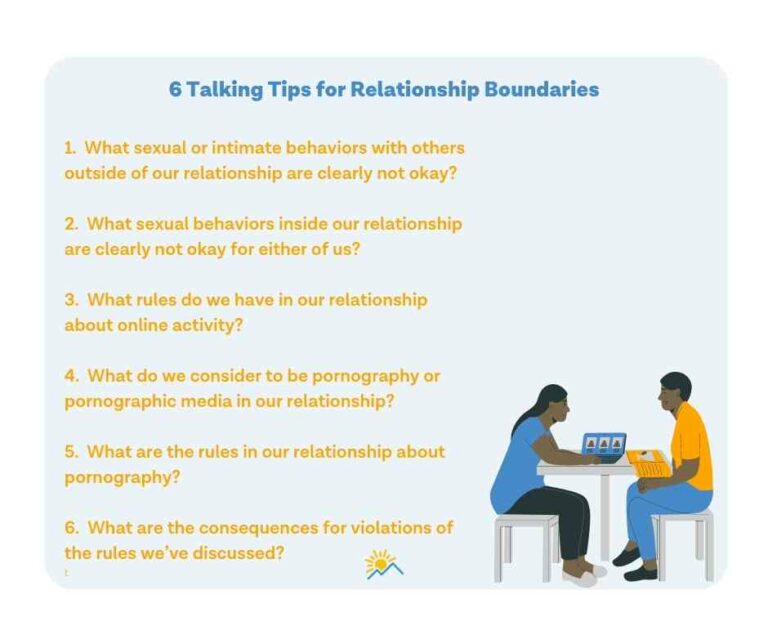Healthy romantic relationships are built on a foundation of trust. Trust is a critical component in all romantic relationships because these relationships are what experts call relationships of choice.
That means that at any moment, either romantic partner can choose to leave the relationship. So each day each partner must continue to choose to remain in the relationship with their partner. This element of choice creates unique anxieties in romantic relationships.
Knowing that your romantic partner may leave at any moment can create a lot of fear and anxiety! This is where trust and commitment comes in. For a healthy relationship to occur, both partners must trust that their romantic partner will remain loyal and committed to the relationship, even when things get hard.
Pornography use can undermine this trust, especially when pornography use remains hidden and lied about. In many relationships, pornography use gets exposed later in the relationship and can take partners and spouses completely by surprise. This can lead to a range of emotions, from anger to sadness to fear.
One of the common terms attached to the emotions that come with the sudden revelation of pornography use is called betrayal trauma. This term is used by clinicians and other relationship experts to describe the intense feelings one partner might have toward another that undermines trust in the relationship. These feelings are one of the reasons why pornography use can be so destabilizing to healthy relationships.
This resource will help you understand what betrayal trauma is, where it comes from, and what you might do to overcome it. You need tools to start building a healthy relationship with your partner if you’re coping with the recent discovery of pornography use. By answering the most common questions people have about betrayal trauma, we hope you can better understand the feelings you may be experiencing and learn to start moving in a healthy direction with your partner.
What is betrayal?
Betrayal refers to violations of boundaries in relationships.
You can think about boundaries like the rules in a relationship. Think about your favorite board game. This game has rules that you and everyone playing has agreed to follow. These rules keep everyone on the same page. You can enjoy the game because you know what each person is allowed and not allowed to do. Relationships are the same way, with boundaries being the agreed upon rules for what is okay and not okay in a relationship.
In healthy relationships, boundaries are slowly developed over time as both partners learn what they want out of the relationship and what works best for the two people involved. For example, a couple may learn while they are dating that each partner has a certain tolerance for watching movies together. One partner may absolutely love movies. They may wish to make watching movies a regular activity. Their partner may desire to do this less often, preferring to be outside in nature or to engage in more active activities.
As their relationship develops, the couple may create boundaries around what is acceptable movie watching behavior based on their differing likes and preferences. They may agree that it’s okay to watch a Sunday movie together, and that the movie loving partner can also have a movie night each weekend that their partner isn’t obligated to attend. They may agree that it wouldn’t be weird or odd for the movie loving partner to catch a movie during a lunch break during the week alone. These movie “rules” will create a series of boundaries around movie behavior in the relationship. These boundaries will create rules, expectations, and behaviors that define part of this couple’s life together.
This same process occurs for many different areas in a relationship. Healthy couples will slowly develop boundaries about hobbies, language, food, and, most importantly for this discussion, sexual intimacy. These boundaries are unique to each couple, although many couples will have similar boundaries based on cultural norms. As we’ve explained, when one partner disregards these boundaries and engages in behavior that was determined to violate relationship boundaries, a sense of betrayal will be felt by the other partner.
So how does this relate to pornography? For most couples, sexual intimacy is one of the most important connective and bonding behaviors they engage in. It involves actions that we often reserve only for those we have a deep emotional bond with. It is one of the things that makes our romantic relationships unique and special, different from both family relationships and friendships.
As we mentioned before, most couples have strict boundaries when it comes to sexual intimacy. Typically, couples have clear and explicit boundaries that make it clear that it is not okay to engage in sexual intimacy with others. Pornography can often feel like a violation of these intimacy boundaries, much like infidelity. Pornography exists in a murky middle ground that for many people still triggers strong emotions tied to these intimacy boundaries.
Let’s think about the basic facts about most pornography use. Most people are viewing pornography to get sexually aroused. Most people are also masturbating to pornography, often fantasizing about what they are seeing, perhaps even placing themselves in these fictional scenarios.
While these acts do not involve another physical person, a partner’s pornography use can still feel like a violation of intimacy boundaries. We realize our partner is thinking and fantasizing about other people outside of the relationship. Not only that, but because of the way pornography depicts sexual intimacy, knowing a partner is viewing and perhaps masturbating to pornography can trigger feelings of inadequacy.
Often this leads one to question their own attractiveness, feelings that only feed into a sense of betrayal. For many people the discovery of pornography can feel very similar to the type of betrayal someone feels when they discover infidelity.

What is trauma
Think back to your childhood. Can you remember a moment during your childhood where you were either very scared or very sad? You likely have very vivid memories of this experience. Even if you were young, you may be able to remember details of the room around you, what you were wearing and maybe exactly what was being said. These vivid memories occur because of what we call trauma.
While physical trauma refers to catastrophic physical injury to the body, psychological trauma happens when we believe or think our survival is in jeopardy. This may be due to an accident or other event occurring around us (think a tornado or other natural disaster) or, more commonly, something someone around has done to us. When we depend on someone or something to survive and then we believe that thing or person may no longer keep us safe, we get confused. We wonder if we can put our survival in that person’s hands.
When we are in a romantic relationship, we put a lot of our emotional and even physical survival in the hands of another person. We may depend on them for economic resources, housing, or other aspects of our well-being. When something occurs that makes us question if we can rely on that person, the potential for trauma occurs.
Whether you realize it or not, when you commit to a romantic partner, you put a lot on the line. When you start a relationship, you always risk getting emotionally hurt if your partner decides to end things. Over time, you also begin to invest in the relationship and start to weave your life together with your partner.
That means you start to expect your partner to do things for you, big and small. This may be as simple as expecting them to take out the trash each morning or as big as expecting them to support you financially. This is why commitment is so scary! It’s scary to depend even a little on someone else that we don’t control. When boundaries are violated in a relationship, our sense of safety in a relationship can be eroded and trauma can occur.
Remember what we said about pornography use leading to you questioning if you are good enough or desirable enough for your partner? Often the discovery of pornography use makes you question something else as well. You wonder if your partner is really committed to you. This is especially true if pornography use is a clear violation of the relationship rules you and your partner have in place about sexual intimacy.
If they have been lying about pornography, you may wonder what else your partner is lying about. You may wonder if they have thought about being sexual or in a relationship with co-workers, friends, or other people who are not just on a computer or phone screen. These feelings do not just create fear and anxiety, but can put doubt in your mind about the future of the relationship.
Trauma may occur when the discovery of pornography makes you question the future of the relationship, even a little, undermining your sense of safety. Whether conscious or not, your brain will begin to fear about where you might live or how you might survive if this romantic relationship ended. Like any trauma, this puts your brain into overdrive and makes you more anxious, hypervigilant, and exhausted.
What is betrayal trauma?
Now that you understand what both betrayal and trauma are, you may be asking yourself what signs to look for that may suggest you’re experiencing this type of intense reaction to your partner’s pornography use. While every person will react differently to the discovery of or disclosure of a partner’s pornography use, there are a few common things to look for that would suggest you may be struggling with betrayal trauma:
Self-medication
Self-medication occurs when a person turns to substances to relieve physical or mental symptoms they are experiencing. For example, drinking an energy drink to help alleviate a stress headache or lighting a cigarette to take the edge off a hard day at work. Self-medication is generally viewed as a negative coping mechanism and can sometimes be a sign of betrayal trauma.
Why would self-medication be linked to betrayal trauma? This has everything to do with stress and anxiety. Betrayal trauma can flood a person with feelings of stress. Since this stress is often tied to a romantic partner who may normally be an important resource, sometimes those who experience betrayal trauma are unsure how to cope with their anxiety. This leads them to turn to substances like smoking, drinking, or other drug use. If you’ve found yourself picking up one of these habits or perhaps you have even seen an increase in your normal substance patterns after the discovery of pornography use, this may be a sign of trauma.

Self-blame
One of the most common signs of betrayal trauma is self-blame. This is when we believe we are the cause of our partner’s negative actions. When it comes to pornography, it’s easy to see where self-blame could creep into someone’s thoughts.
You may begin to think you aren’t attractive enough or sexy enough for your partner. You may think that if you were just a little more physical or more engaged with your partner, they wouldn’t need to turn to porn. You may think that if you took better care of yourself, exercised more, or had better make-up or clothes, maybe the pornography use would go away.
All these thoughts are self-blame and could be tied to betrayal trauma. These feelings come from wanting to regain a sense of control in a situation where you may not have much control at all. If it was your fault, you feel like you can control it, making the situation feel less traumatic.
The reality is that partners rarely have much to do with regular pornography use. In fact, odds are your partner’s engagement with pornography predates your relationship. If you find yourself blaming yourself again and again for your partner’s behavior, these may be signs that you’re trying to cope with the reality of betrayal trauma.
Dissociation
The last common thing to look for is dissociation. Dissociation can sound like a scary word and when it becomes severe, it can look scary.
Severe dissociation often means someone has a break from reality, feeling like they are outside of their body and mind, watching from a distance. This can result in someone becoming non-responsive to those around them and entering a catatonic state where they stop speaking or interacting with those around them. Luckily, these types of severe dissociation symptoms rarely if ever occur with the type of betrayal trauma experienced with pornography.
With pornography, dissociation symptoms are often more subtle. You may catch yourself daydreaming or losing focus easily. You may have a hard time concentrating at work or at home and normal daily tasks may take much longer than usual. You may get lost in your thoughts and realize you’ve been sitting in the same spot much longer than you anticipated. While none of these behaviors on their own is problematic, when this type of subtle mental dissociation becomes a regular pattern, it may be a sign of betrayal trauma.
As our mind struggles to make sense of the betrayal we’ve experienced, it may try to avoid additional stress by concentrating on random topics or putting energy into a wandering array of random thoughts and ideas. Keep an eye on if you get easily distracted during the day or are increasingly lost in your thoughts. This regular pattern may be another sign of betrayal trauma.
Keep in mind that these are only a few common things to look for that may suggest betrayal trauma has occurred. Each experience with trauma is slightly different and if you suspect you may be struggling with trauma tied to your partner’s pornography use, we recommend getting an expert opinion from a local mental health professional.
Are my feelings of betrayal and distrust normal?
It is very common to wonder if feelings of betrayal trauma are normal. Sometimes it can feel like pornography use shouldn’t create these types of intense emotions. You may even have friends, family members, or even your spouse say that you’re overreacting or being too emotional. When we get these types of messages, we don’t feel validated and instead feel alone and isolated.
So is this type of trauma common for people learning of their partner’s pornography use? Yes, experiencing betrayal trauma tied to the discovery of a partner’s pornography use is completely normal. While not everyone will have this type of intense reaction, many partners and spouses find themselves have strong and confusing emotional reactions to their partner’s pornography use.
It is real! Your feelings and thoughts may seem irrational and confusing. The important thing to keep in mind is that your experiences are valid AND there is hope for healing when you acknowledge the legitimate hurt you are experiencing.
Remember a few basic facts:
- Your relationship was built on trust as you built up relationship boundaries over time. You trusted that your partner would adhere to these boundaries.
- Pornography use was a violation of that trust.
- When trust is broken or violated in a relationship, it is normal and common to have doubts about what that means for the future of the relationship. It’s no longer just about the pornography, it’s about having a partner who was willing to violate a boundary in the relationship.
The strong emotions and feelings of betrayal trauma you are experiencing are only partially about the pornography use itself. These feelings are often bigger than that, tapping into new fears and anxieties about your relationship as a whole.
Again, these are normal feelings! Just because you are experiencing and working through these feelings, doesn’t mean your relationship should or will end. It only means that it is normal to feel these types of stresses, anxieties, and fears in this type of situation.

How can I work on these feelings?
Moving past betrayal trauma can be a complicated and sometimes lengthy process. We always recommend that you start by seeking out trained mental health professionals in your area, especially those who may specialize in betrayal trauma due to sex related issues. These professionals will be able to help you navigate your own feelings and thoughts on your unique situation. Professionals who work with couples can also work with you and your partner to increase communication skills and help repair trust that may have been broken due to pornography.
There are also a few things you can try at home that may also help you cope with the strong emotions that come from betrayal trauma. Here are two helpful activities you can try at home:
Practice journal sharing
Sometimes betrayal trauma makes communicating with a romantic partner challenging. With such strong emotions being experienced, it can be hard to find the right words or keep a cool head during these conversations. Journal Share is a method of being able to communicate your thoughts and feelings to your partner. Here’s what you do:
- For the next week, journal each day about your feelings and thoughts regarding what’s happened and happening in your relationship regarding pornography. Focus on what you are thinking and feeling, not just blaming, or getting angry at your partner (although it’s okay to say you feel angry).
- At the end of the week, share this journal with your romantic partner. You don’t have to be there when they read it. Simply hand it to them and let them read it on their own time.
Option A: Schedule a time to sit down and talk about what you wrote with your partner. Again, this isn’t a time to get defensive (for either partner), but to make sure your thoughts and feelings are being heard and understood. You’re not trying to solve anything with this conversation. You’re simply trying to understand each other.
Option B: If a face-to-face conversation about what you wrote feels too stressful, have your partner write out a response in an email or journal and give it back to you to read. While it may feel silly to be writing to each other when you see each other every day, this written communication can be a bridge towards having harder conversations face-to-face.

Schedule a boundaries talk
A boundaries talk is where you have a very clear and explicit conversation about your relationship boundaries. Most couples fail to have clear boundary discussions while they are dating or married.
For most of these couples, they figure out their boundaries in an implicit way over time and are able to function with a general understanding of the rules and boundaries of their relationships. When pornography use has violated your boundaries, it may be beneficial to have a more open and clear discussion about boundaries relating to your relationship and sexual intimacy.
Pick a time with your partner and have a discussion about boundaries. Consider using the following questions as primers for this discussion:

Now that you understand what betrayal trauma is and have a better grasp on why it occurs, we hope you will seek out the resources and help that you need to ensure that you can move forward in a way that will make you and your relationship as healthy and happy as possible.
14-Day Free Trial
Protection From Pornography
Change your habits, change your life: Start our 14-day free trial to help get rid of pornography for good.




